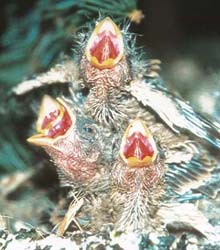Mother Finch Controls Baby’s Sex to Increase Survival Odds

Image ©Science/A. Badyaev
Most mothers-to-be must simply hope for healthy offspring. But female house finches tip the odds in their babies’ favor by pre-determining their gender, a new study suggests. According to a report published in the current issue of the journal Science, enterprising mother house finches adjust the sex and growth of their offspring to account for the order in which the eggs are laid, thereby reducing the mortality of their sons and daughters by 10 to 20 percent.
Alexander Badyaev of the University of Montana, Missoula, and colleagues studied two populations of the house finch, Carpodacus mexicanus, that have diverged significantly over the past 20 years. The scientists found predictable patterns in how a baby finch’s sex and position in the laying order affected both its growth pattern and its chance of survival. In the Montana population, first-born females exhibited better survival odds than their male counterparts did. But in Alabama, first-born males survived more often. Such survival discrepancies seem to drive maternal finches to select whether sons or daughters hatch first. “Breeding females in both Montana and Alabama populations lay male and female eggs in different sequences within clutches,” the authors write, “thus placing sons and daughters in the most advantageous positions for survival in that particular environment.”
Exactly how finch mothers control their offspring’s sex, survival and growth remains a mystery. The researchers note that such adjustments facilitate adaptation to local environments. Observing such acclimatization, they conclude, provides “empirical support for the hypothesis that parental effects play a crucial role at the initial stages of population divergence by enabling establishment of populations in novel environments.”
Media Contact
All latest news from the category: Life Sciences and Chemistry
Articles and reports from the Life Sciences and chemistry area deal with applied and basic research into modern biology, chemistry and human medicine.
Valuable information can be found on a range of life sciences fields including bacteriology, biochemistry, bionics, bioinformatics, biophysics, biotechnology, genetics, geobotany, human biology, marine biology, microbiology, molecular biology, cellular biology, zoology, bioinorganic chemistry, microchemistry and environmental chemistry.
Newest articles

Skyrmions move at record speeds
… a step towards the computing of the future. An international research team led by scientists from the CNRS1 has discovered that the magnetic nanobubbles2 known as skyrmions can be…

A flexible and efficient DC power converter for sustainable-energy microgrids
A new DC-DC power converter is superior to previous designs and paves the way for more efficient, reliable and sustainable energy storage and conversion solutions. The Kobe University development can…

Technical Trials for Easing the (Cosmological) Tension
A new study sorts through models attempting to solve one of the major challenges of contemporary cosmic science, the measurement of its expansion. Thanks to the dizzying growth of cosmic…





















